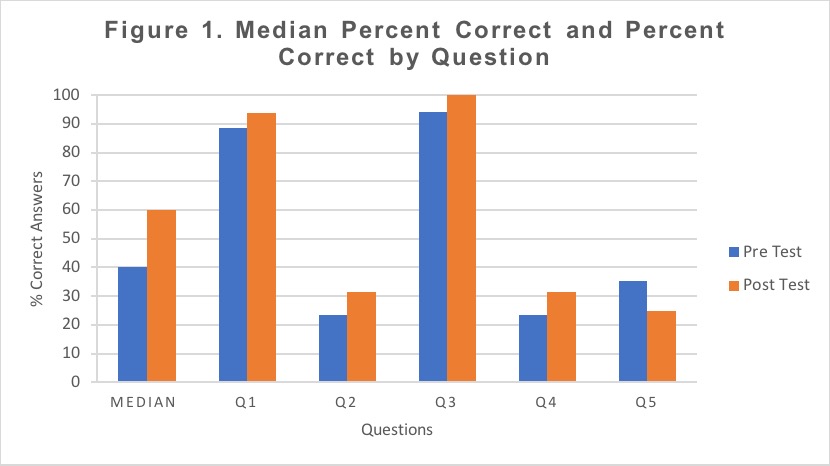Session Information
Date: Monday, November 9, 2020
Session Type: Poster Session D
Session Time: 9:00AM-11:00AM
Background/Purpose: In many hospitals residents are the first providers to evaluate new patients. Consequently, residents often initiate the work-up of newly admitted patients. Multiple studies have shown that anti-nuclear antibody (ANA) testing is overutilized in both inpatient and outpatient settings 1,2. Inappropriate ordering and misinterpretation of this test can lead to a subsequent cascade of unnecessary investigation which may lead to iatrogenic harm and waste resources. ABIM/ACR “Choosing Wisely” recommendations include: Don’t test ANA sub-serologies without a positive ANA and clinical suspicion of immune-mediated disease.
Thus, it is vital that residents receive training about appropriate ANA testing. The aim of this study was to assess the effectiveness of an educational intervention on the appropriateness of ordering ANA testing in a community-based internal medicine program.
Methods: A 30-minute evidence-based presentation on ANA testing was developed and delivered to residents, medical students and faculty attending the weekly Internal Medicine (IM) resident didactics. Topics covered included:
- ACR’s “Choosing Wisely” recommendations for ANA testing
- Clinical scenarios with discussions of appropriateness of ordering ANA in different patient cases
- Methods used for ANA testing
- Operating characteristics of ANA including: sensitivity, specificity and positive predictive value.
- Interpretation of titers, patterns and specific ANA antibodies.
Five patient case scenarios evaluating each of the covered knowledge domains were created for use as a pre/post-test measure. These were administered as a pre and post-intervention test to all attendees. To assure the content validity of the presentation, the presentation and questionnaire were reviewed, edited and approved by the IM Residency Education Director (a hospitalist), an IM residency core faculty (a primary care physician), a Scholarly Activity support person and a board-certified rheumatologist. To assess the quality of test questions we conducted item analysis 3.
Results: Thirteen residents, three medical students and one faculty member participated. The median percentage of correct answers for the pre and post-tests were 40% and 60%, respectively (Figure 1). The number of correct answers increased in 4 of 5 questions and decreased in the 5th question. The mean item difficulty index was 0.529 (range 0.235 – 0.941) and mean discrimination index was 0.305 (range 0.235-.353). All were above the 0.20 threshold which is considered satisfactory.
Conclusion: Residents should be educated regarding the ACR Choosing Wisely recommendations. The intervention overall showed improved knowledge scores on post-tests. Revision of test questions may provide better discrimination of knowledge gains.
References
- Davis LA, Goldstein B, Tran V, Keniston A, et al. Applying choosing wisely: antinuclear antibody (ANA) and sub-serology testing in a safety net hospital system. Open Rheumatol J. 2015;9:82‐87.
- Abeles AM, Abeles M. The clinical utility of a positive antinuclear antibody test result. Am J Med. 2013;126:342-8.
- Mehrens WA, Lehmann IJ. Measurement in Education and Psychology. Fort Worth (TX): Harcourt Brace College Publishers; 1991.p160-166
 Figure 1. Median Percent Correct and Percent Correct by Questions
Figure 1. Median Percent Correct and Percent Correct by Questions
To cite this abstract in AMA style:
Qaiser I, Koehler T, Martin R. Training Residents to ‘Choose Wisely’ When Testing for Antinuclear Antibodies [abstract]. Arthritis Rheumatol. 2020; 72 (suppl 10). https://acrabstracts.org/abstract/training-residents-to-choose-wisely-when-testing-for-antinuclear-antibodies/. Accessed .« Back to ACR Convergence 2020
ACR Meeting Abstracts - https://acrabstracts.org/abstract/training-residents-to-choose-wisely-when-testing-for-antinuclear-antibodies/
